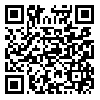Volume 4, Issue 3 (9-2022)
Tabari Biomed Stu Res J 2022, 4(3): 9-15 |
Back to browse issues page
Download citation:
BibTeX | RIS | EndNote | Medlars | ProCite | Reference Manager | RefWorks
Send citation to:



BibTeX | RIS | EndNote | Medlars | ProCite | Reference Manager | RefWorks
Send citation to:
Araghian Mojarad F, Salehiniya H, Davoodi L, Ghasemian M, Nazari N, Ebrahimzadeh A et al . Evaluation of the Effect of Patient Education and Telephone Follow-Up on Self-Care, Self-Efficacy, and Admission Rate of Heart Patients with COVID-19. Tabari Biomed Stu Res J 2022; 4 (3) : 15
URL: http://tbsrj.mazums.ac.ir/article-1-3773-en.html
URL: http://tbsrj.mazums.ac.ir/article-1-3773-en.html
Fereshteh Araghian Mojarad *1 

 , Hamid Salehiniya2
, Hamid Salehiniya2 

 , Lotfollah Davoodi3
, Lotfollah Davoodi3 

 , Masoumeh Ghasemian4
, Masoumeh Ghasemian4 

 , Nahid Nazari4
, Nahid Nazari4 

 , Abolfazl Ebrahimzadeh5
, Abolfazl Ebrahimzadeh5 

 , Kobra Abdi4
, Kobra Abdi4 




 , Hamid Salehiniya2
, Hamid Salehiniya2 

 , Lotfollah Davoodi3
, Lotfollah Davoodi3 

 , Masoumeh Ghasemian4
, Masoumeh Ghasemian4 

 , Nahid Nazari4
, Nahid Nazari4 

 , Abolfazl Ebrahimzadeh5
, Abolfazl Ebrahimzadeh5 

 , Kobra Abdi4
, Kobra Abdi4 


1- Traditional and Complementary Medicine Research Center, Mazandaran University of Medical Sciences, Sari, Iran.
2- Social Determinants of Health Research Center, Birjand University of Medical Sciences, Birjand, Iran.
3- Microbial Resistance Research Center, Mazandaran University of Medical Sciences, Sari, Iran.
4- Fatemeh Zahra Hospital, Mazandaran University of Medical Sciences, Sari, Iran.
5- Student Research Committee, School of Nursing and Midwifery, Mazandaran University of Medical Sciences, Sari, Iran.
2- Social Determinants of Health Research Center, Birjand University of Medical Sciences, Birjand, Iran.
3- Microbial Resistance Research Center, Mazandaran University of Medical Sciences, Sari, Iran.
4- Fatemeh Zahra Hospital, Mazandaran University of Medical Sciences, Sari, Iran.
5- Student Research Committee, School of Nursing and Midwifery, Mazandaran University of Medical Sciences, Sari, Iran.
Abstract:
Introduction: Telephone follow-up is known for sharing information, providing health education, diagnosing complications quickly, managing symptoms, and providing quality aftercare services. The aim of this study was to investigate the effect of patient education and telephone follow-up on self-care and self-efficacy as well as readmission rate of heart patients with COVID-19.
Material and Methods: In this interventional study, 64 heart patients with COVID-19 admitted to a training center in northern Iran during the period from June 1 to September 22, in 2020 were intervened. Data collection tools included demographic and clinical questionnaires, Scherer self-care and self-efficacy questionnaires. After completing the questionnaires and teaching self-care about corona disease and heart disease to patients during six sessions over the phone (10-20 minutes), the researcher again completed the self-care and self-efficacy questionnaires on the fourteenth day. For data analysis, paired t-test and independent t-test were used using SPSS software version 21.
Results: The mean age of participants was 59.53±15.32. The results showed that the mean score of self- care after the intervention had a significant increase (P<0.001), so that the mean score of self- care before the intervention was 54 and after the intervention was 60.14, the mean score of self-efficacies after the intervention increased which is not statistically significant.
Conclusion: Education and follow-up of heart patients with COVID-19 is associated with increased self-care in patients every day. Therefore, follow-up programs, especially telephone follow-up, are recommended to improve the health status of patients.
Material and Methods: In this interventional study, 64 heart patients with COVID-19 admitted to a training center in northern Iran during the period from June 1 to September 22, in 2020 were intervened. Data collection tools included demographic and clinical questionnaires, Scherer self-care and self-efficacy questionnaires. After completing the questionnaires and teaching self-care about corona disease and heart disease to patients during six sessions over the phone (10-20 minutes), the researcher again completed the self-care and self-efficacy questionnaires on the fourteenth day. For data analysis, paired t-test and independent t-test were used using SPSS software version 21.
Results: The mean age of participants was 59.53±15.32. The results showed that the mean score of self- care after the intervention had a significant increase (P<0.001), so that the mean score of self- care before the intervention was 54 and after the intervention was 60.14, the mean score of self-efficacies after the intervention increased which is not statistically significant.
Conclusion: Education and follow-up of heart patients with COVID-19 is associated with increased self-care in patients every day. Therefore, follow-up programs, especially telephone follow-up, are recommended to improve the health status of patients.
Article number: 15
Send email to the article author
| Rights and permissions | |
 |
This work is licensed under a Creative Commons Attribution-NonCommercial 4.0 International License. |




